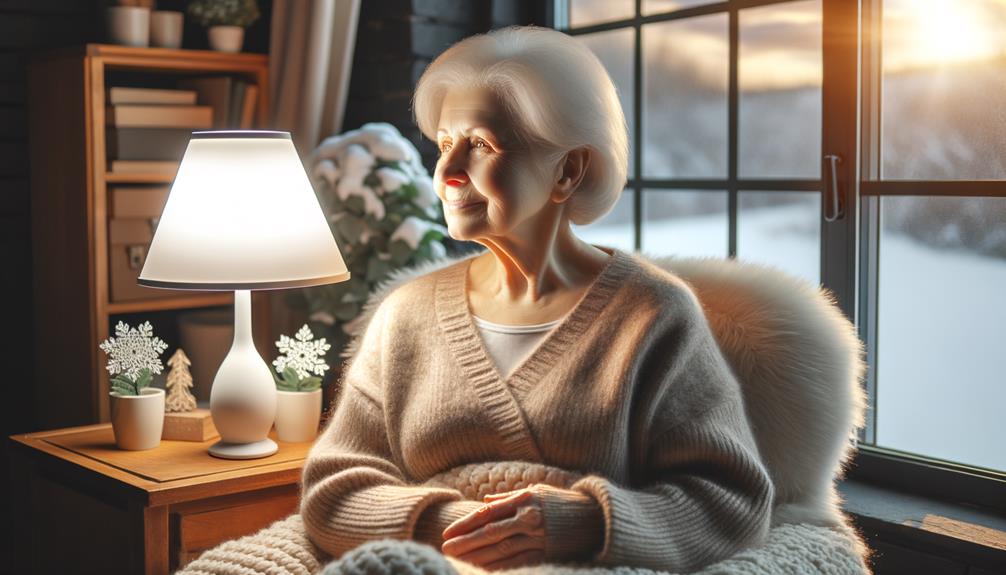To cope with Seasonal Affective Disorder during Canada's long winters, seniors can adopt several strategies. Regular physical activity, like walking or yoga, helps boost mood and energy levels naturally. A balanced diet rich in Omega-3 fatty acids and Vitamin D supports mental health. Creating a bright and airy living environment with natural light and light therapy boxes can also help. Staying connected with friends and family through regular calls or social gatherings is vital in combating isolation. If symptoms persist, consulting a healthcare provider is crucial. By incorporating these techniques, seniors can better navigate the challenges of winter.
Understanding SAD in Seniors
Understanding SAD in seniors requires recognizing their heightened vulnerability due to reduced mobility and social isolation. Seasonal Affective Disorder (SAD) primarily strikes during the fall and winter months, and its impact on seniors' mental health is significant. Approximately 5% of adults in the United States, particularly seniors, experience SAD, which can greatly disrupt daily life. The symptoms of SAD often mimic those of typical depression, including persistent sadness, fatigue, difficulty concentrating, and changes in sleep and appetite patterns.
It's crucial to pay close attention to these symptoms in our senior population, as the interplay between SAD and their physical health is significant. Reduced mobility can exacerbate feelings of isolation, further intensifying the effects of SAD. Moreover, addressing the mental health of seniors with SAD is not only about alleviating depressive symptoms but also about improving their overall physical well-being.
To effectively manage SAD in seniors, it's vital to recognize the signs and seek professional help promptly. Early intervention can prevent the escalation of symptoms and promote better mental and physical health outcomes. By prioritizing understanding and addressing SAD in seniors, we can improve their quality of life during the long winter months.
Importance of Physical Activity

Let's talk about the importance of physical activity in managing Seasonal Affective Disorder (SAD). Exercise is a natural mood booster, releasing beneficial hormones that enhance overall health. To reap these benefits, aim for at least 30 minutes of physical activity three times a week.
Boosts Mood Naturally
Engaging in regular physical activity is crucial for boosting mood and combating the winter blues. When we participate in physical activities, our bodies release endorphins, which are natural mood lifters that alleviate feelings of sadness and promote a sense of well-being.
Regular exercise also enhances our energy levels and reduces fatigue, which can be especially problematic during the long, dark winters. By committing to at least 30 minutes of physical activity three times a week, we can notably improve our mood and overall energy. When possible, incorporating outdoor activities can make a significant difference, as natural sunlight helps regulate our circadian rhythms and boosts serotonin levels, a neurotransmitter linked to happiness.
For seniors, incorporating physical activities such as walking, yoga, or light stretching can make a substantial difference. Studies show that these activities can alleviate symptoms of depression and provide a natural method to combat seasonal affective disorder. By prioritizing physical activity, we can harness these benefits and support our community in staying healthy and happy during Canada's long winters.
Enhances Overall Health
Regular physical activity plays a vital role in enhancing overall health, particularly for seniors. Engaging in consistent exercise helps manage chronic pain and releases hormones that boost mood and energy levels. For optimal results, seniors should combine physical and mental aspects into their routines. Activities like Tai Chi excel in this regard, as they merge gentle physical exercise with mindfulness, promoting holistic well-being.
A healthy diet is crucial alongside regular physical activity to maximize health benefits. Proper nutrition fuels our bodies, making exercise more effective and sustainable. A balanced diet also contributes to better mental health, complementing the mood-boosting effects of physical activity.
Before starting any new exercise routine, seniors should consult with their doctors to ensure safety and appropriateness. By incorporating self-care strategies, such as setting realistic goals and engaging in enjoyable activities, seniors can further enhance their adherence to an active lifestyle.
Numerous online workout programs and resources are available for free or at a low cost, providing structured exercise plans tailored to seniors' needs. These resources make it easier to stay active during Canada's long winters.
Nutritional Support for Mental Health

During Canada's long winters, it's essential to prioritize our mental health through a balanced diet. Omega-3 fatty acids, found in fish and flaxseeds, play a crucial role in supporting our mental well-being. With limited sunlight exposure, consuming vitamin D-rich foods like fortified milk and fatty fish helps compensate for the deficiency. Moreover, antioxidant-rich foods such as berries and leafy greens can combat oxidative stress, promoting mood stability.
Omega-3 Fatty Acids
Incorporating omega-3 fatty acids into our diet can greatly support mental health by reducing inflammation and promoting brain function. Research shows that these essential fatty acids can help alleviate symptoms of depression and improve overall mood, particularly in seniors during the challenging winter months. As we serve our senior community, it's crucial to understand the importance of omega-3 fatty acids in maintaining mental well-being.
To ensure adequate intake of omega-3 fatty acids, consider the following options:
Consuming fatty fish like salmon and mackerel, rich in omega-3s, can significantly enhance mental health.
Adding flaxseeds, chia seeds, and walnuts to meals provides a plant-based alternative for those who may not consume fish.
Omega-3 supplements are a practical option for seniors who may struggle to get enough from their diet alone.
Vitamin D Intake
Maintaining adequate vitamin D levels is crucial for regulating mood and alleviating symptoms of depression, particularly during Canada's long winter months. As lack of sunlight can lead to vitamin D deficiency, seniors should monitor their vitamin D intake to support their mental health.
To combat seasonal affective disorder (SAD), strategic supplementation can be helpful. Consulting with a healthcare provider is necessary to receive personalized advice on the appropriate dosage and form of vitamin D supplementation.
In addition to supplements, incorporating vitamin D-rich foods into the diet is vital. Fatty fish like salmon and mackerel, eggs, and fortified dairy products can greatly boost vitamin D intake. These dietary choices not only enhance physical health but also contribute positively to mental well-being.
Ensuring sufficient vitamin D intake can help mitigate the risk of depression among seniors during winter. By emphasizing both dietary sources and mindful supplementation, we can better support the mental health of seniors and help them navigate the challenges posed by Canada's extended winters.
Antioxidant-rich Foods
Antioxidant-rich foods like berries, nuts, and leafy greens play a vital role in reducing inflammation and oxidative stress in the brain, which in turn supports mental health. For seniors, incorporating these foods into their diet can be particularly beneficial during Canada's long winters when Seasonal Affective Disorder (SAD) becomes a concern. Research shows that a diet high in antioxidants can improve mood, cognition, and overall well-being.
To help seniors combat SAD and bolster brain function, consider the following strategies:
- Include a variety of antioxidant-rich foods in daily meals. Foods like dark chocolate, beans, and colorful fruits provide essential nutrients that combat depression and anxiety.
- Leafy greens and nuts are not only rich in antioxidants but also contain vitamins and minerals that support brain health and cognitive function, crucial for maintaining a positive mental outlook.
- Encourage consistent intake of antioxidant-rich foods. Integrating these foods into every meal can help maintain mental health and protect against age-related cognitive decline.
Creating a Bright Living Space

To combat Seasonal Affective Disorder, prioritize increasing your exposure to natural light by opening curtains and blinds during daylight hours. This simple action can greatly enhance your mood and energy levels. Positioning your furniture near windows can additionally maximize natural light exposure, creating a bright living space conducive to mental well-being.
Using light therapy boxes that mimic natural sunlight can be an effective strategy. These devices help regulate your mood and energy levels, especially during the shorter daylight hours of Canada's long winters.
To create an uplifting environment, consider painting walls in bright, cheerful colors. This can improve the overall ambiance and make your living space feel more welcoming and vibrant. Incorporating indoor plants not only brings a touch of nature indoors but also helps improve air quality and boost your mood.
| Strategy | Benefits |
|---|---|
| Natural Light Exposure | Enhanced mood and energy levels |
| Light Therapy Boxes | Regulated mood and energy levels |
| Indoor Plants | Improved air quality and mood |
Benefits of Light Therapy

Creating a bright living space is crucial in managing Seasonal Affective Disorder, but light therapy offers an additional scientifically-backed method to alleviate symptoms. Sitting near a light box that mimics natural sunlight can be particularly beneficial for seniors. This treatment has been shown to greatly improve mood and energy levels, making it an invaluable tool for combating the depressive symptoms associated with Seasonal Affective Disorder.
Three key advantages of light therapy for seniors are:
- Rapid Relief: Studies indicate that light therapy can improve symptoms in just a few days, providing quick relief during long, gloomy winters.
- Mood Regulation: Regular use helps maintain a stable mood and energy levels, essential for daily functioning and overall well-being.
- Safe and Non-Invasive: Light therapy is a safe option for seniors, with minimal side effects.
Incorporating light therapy into your daily routine is simple. Using the light box for about 20-30 minutes each morning can effectively manage the symptoms of Seasonal Affective Disorder and enhance your overall quality of life during Canada's long winters.
Staying Socially Connected

Maintaining social connections is vital for seniors to combat Seasonal Affective Disorder and improve overall mental health during the long Canadian winters. Feeling isolated can worsen depression and anxiety, so it's crucial to prioritize interactions with loved ones. Regular get-togethers with friends and family, whether in-person or virtual, can greatly boost our mood and combat the winter blues.
Phone and video calls offer excellent ways to stay connected, ensuring that physical distancing doesn't lead to social isolation. Make it a habit to schedule regular calls with loved ones to share experiences and provide mutual support. This consistent communication fosters emotional well-being and strengthens relationships.
Volunteering is another powerful strategy to consider. Helping others not only benefits the community but also enhances our own mood and creates new friendships. Engaging in volunteer work can provide a sense of purpose and belonging, which are vital for maintaining mental health during the winter months.
Seeking Professional Help

Recognizing when to seek professional help for Seasonal Affective Disorder (SAD) is crucial for managing severe symptoms and maintaining overall mental health, particularly for seniors during Canada's long winters. While self-care strategies can alleviate mild SAD symptoms, professional assistance becomes necessary when symptoms worsen or become unmanageable.
There are three key indicators that professional help is needed:
- Persistent Depression: If a senior experiences ongoing feelings of sadness or hopelessness that don't improve with self-care measures, it's time to consult a healthcare provider.
- Significant Weight Changes: Unexplained weight loss or gain can be a sign that SAD is affecting overall health, necessitating professional intervention.
- Thoughts of Suicide: Immediate professional assistance is crucial if a senior has thoughts of suicide or self-harm due to SAD.
Professional help can include therapy, medications, or specialized treatments like light therapy. Promptly seeking help ensures seniors receive the thorough care they need to combat Seasonal Affective Disorder effectively. This proactive approach not only addresses their mental health but also enhances their overall quality of life during the challenging winter months.
Frequently Asked Questions
How to Survive the Winter Blues in Canada?
To survive the winter blues in Canada, prioritize daily exposure to natural light, regular physical activity, and a balanced diet. If needed, consider consulting a healthcare professional about light therapy or medication to improve your mental health during the long winter months.
How Do You Beat the Winter Blues for Seniors?
To help seniors overcome the winter blues, encouraging daily light therapy is a great starting point. Indoor physical activities can also play a significant role in improving their mood. A balanced diet and maximizing daylight exposure can work wonders too. Lastly, fostering social connections through hobbies and friendships can make a big difference, and it's backed by evidence.
What Treatment Is Recommended for People With Winter Seasonal Affective Disorder?
Light therapy is incredibly effective for people with winter seasonal affective disorder. In severe cases, antidepressants may also be necessary. Additionally, behavioral therapy, regular physical activity, and ensuring adequate vitamin D levels can provide further support. By combining these approaches, we can provide comprehensive care for those affected.
Which Natural Treatment Has Been Useful in Treating People With Seasonal Affective Disorder?
We've found that light therapy is a natural and effective way to treat Seasonal Affective Disorder. Using a light box daily in the morning for 20-30 minutes can significantly improve mood and regulate circadian rhythms.



